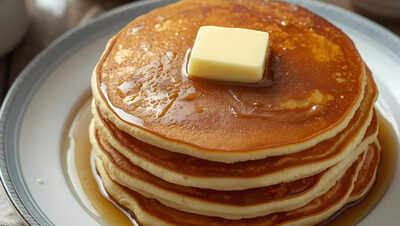ARTICLE AD BOX

That warm, buttery stack of pancakes with golden syrup feels like the perfect morning treat. Sweet, soft and comforting, it’s a breakfast classic that few can resist. But have you ever stopped to wonder what happens inside your body after you eat them? The answer might surprise you.A peer-reviewed study published in The American journal of clinical nutrition found that consuming refined carbohydrates such as white flour and syrup early in the day can trigger sharp spikes and crashes in blood sugar. These fluctuations affect mood, energy and even hunger hormones, often leading to mid-morning fatigue or sugar cravings later on.
Pancakes and blood sugar levels after breakfast
When you eat pancakes, your digestive system quickly converts the refined flour and sweet toppings into glucose, your body’s main source of energy.
Unlike whole grains or oats, this type of carbohydrate breaks down rapidly, sending a surge of sugar into your bloodstream.To control this spike, your pancreas releases insulin, the hormone responsible for moving glucose into cells for energy. The problem is that such quick digestion leads to an equally fast drop in sugar levels. That’s why after eating pancakes, you may feel energised for a short while but sluggish and hungry soon after.
Pancakes and insulin response in your body
Insulin spikes caused by eating pancakes frequently can have lasting effects on your metabolism. Research in the American Journal of Clinical Nutrition shows that diets high in refined carbohydrates increase the risk of insulin resistance, a condition where cells stop responding properly to insulin.When this happens, glucose stays in the bloodstream longer, promoting inflammation and fat storage. Over time, this imbalance can raise the risk of developing metabolic disorders such as type 2 diabetes.
So while pancakes may seem harmless, having them too often without fibre or protein can stress your body’s natural regulation systems.
Pancakes and your mood after breakfast
There is also a strong connection between pancakes and how you feel after eating them. Your brain runs on glucose, but it prefers a steady supply rather than sudden spikes. When you eat pancakes, the quick sugar rush increases dopamine levels, giving you that instant happy, energised feeling.However, as blood sugar falls, dopamine levels drop too, often leading to irritability or fatigue. Studies in Frontiers in Nutrition indicate that people who consume refined carbs like pancakes early in the day experience more mood swings and concentration dips compared to those who eat balanced breakfasts with fibre and protein.
Pancakes and how to make them healthier
You do not need to stop eating pancakes altogether. The key is to make them smarter.
Use wholegrain, oat or buckwheat flour instead of white flour to slow digestion. Add a source of protein such as eggs, Greek yoghurt or nut butter to your plate. Top your pancakes with fresh fruits and seeds instead of syrup for extra fibre and antioxidants.Pancakes are not the enemy; imbalance is. Eating them once in a while is perfectly fine, but making them a daily habit can put unnecessary strain on your body’s metabolic system.
Your best approach is moderation and mindful pairing.Combine your favourite pancakes with nutrient-dense sides and aim for balance in your overall diet. By understanding how your body reacts, you can enjoy your breakfast favourites without feeling guilty or drained later in the day.Disclaimer: This article is for general informational purposes only and is not a substitute for professional medical advice, diagnosis, or treatment. Always seek the guidance of a qualified healthcare provider regarding any medical condition or lifestyle change.Also read| Can you inherit a heart attack? Understanding family history and genetic risk factors

 5 hours ago
3
5 hours ago
3








 English (US) ·
English (US) ·